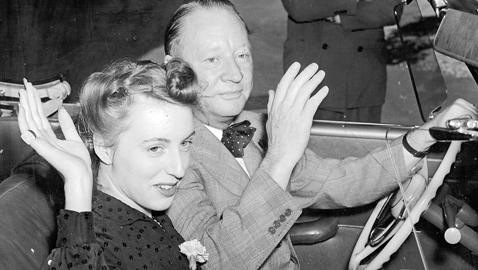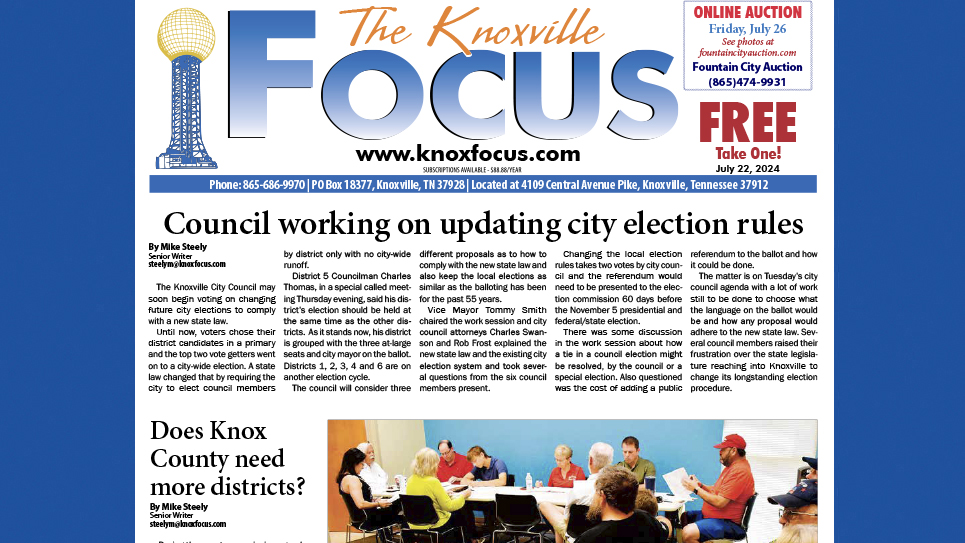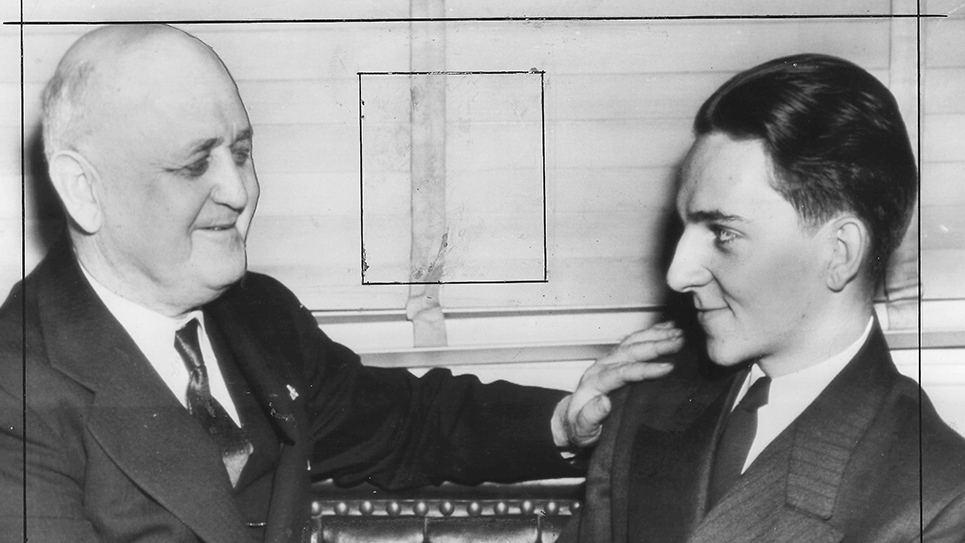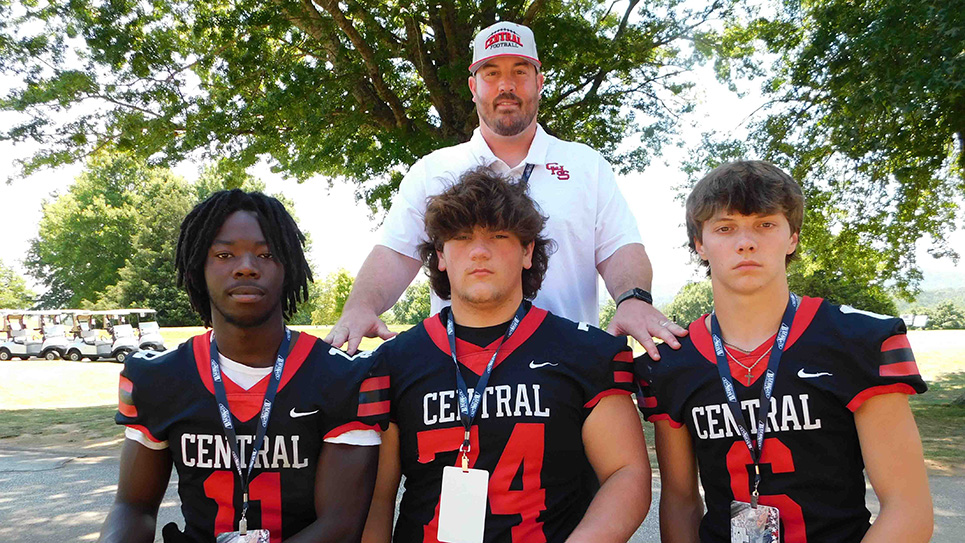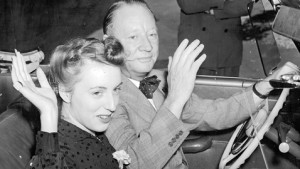
Senator Robert Rice Reynolds with his young bride Evalyn McLean. From the author’s personal collection.
In a time when the South had some of the most flamboyant politicians in the country, few exceeded Robert Rice Reynolds of North Carolina for his flair. Over time, Reynolds’s penchant for flair degenerated into buffoonery, a condition few politicians can successfully survive. Bob Reynolds was from Asheville, Buncombe County, North Carolina and soon was widely known as “Buncombe Bob” for more than his home. Reynolds was frequently married and flirted with fascism in a region that was perhaps the least isolationist in the entire country.
Reynolds was born June 18, 1884 and began practicing law in Asheville. Reynolds was the prosecuting attorney for Buncombe County from 1910-14 and the experience only whetted his appetite for higher political office. Reynolds sought the Democratic nomination for Lieutenant Governor of North Carolina in the 1924 primary but lost. Undeterred by his defeat, Reynolds was soon campaigning for the United States Senate two years later against incumbent Lee S. Overman, the first person ever to be popularly elected to the Senate from North Carolina. Senator Overman easily defeated Bob Reynolds, but Reynolds proved to be quite persistent. Overman died suddenly on December 12, 1930 and former governor Cameron Morrison was appointed to fill the vacancy.
Morrison was a stately man and, while not born to wealth, had married a widow who was quite wealthy. Morrison was a man of distinguished appearance with the courtly manners expected of a successful Southern politician. Bob Reynolds saw his opportunity and when Morrison came up for election in 1932, Reynolds challenged him for the Democratic nomination. Bob Reynolds had been preparing for another bid for public office long before the 1932 senatorial primary. Reynolds loved to travel and he regularly sent back colorful post cards from various cities across the globe to literally thousands of friends and acquaintances across North Carolina. Virtually nobody gave Reynolds much of a chance to upset Senator Morrison in the primary, but the crafty Reynolds, styling himself as “Our Bob” rather than “Buncombe Bob”, proved to be an exceptional political showman at a time when many North Carolinians were suffering extreme deprivation due to the Great Depression.
The opportunity for Bob Reynolds to reach his goal of being elected to high office in North Carolina had its origins four years earlier. Furnifold M. Simmons was North Carolina’s senior United States Senator and the leader of the political machine that had been the strongest force in state politics. Simmons had refused to back the Democratic presidential nominee in 1928, Governor Alfred E. Smith, a wet, New York Catholic who was unpopular in much of the South precisely because of his religion and stand against prohibition. Simmons’s defection and support of Republican Herbert Hoover proved to be a fatal political mistake. Simmons was defeated in 1930 by Josiah W. Bailey, but Simmons was still in office when President Herbert Hoover nominated a North Carolinian to serve on the Federal Power Commission. Hoover’s nomination of Frank R. McNich, a loyal member of the Simmons machine who had also left the Democratic Party to back Hoover, proved to be wildly unpopular with most North Carolina Democrats. Senator Simmons naturally supported McNinch, while Senator Overman died of a heart attack before expressing his own opinion publicly. That left Cameron Morrison in the uncomfortable position of coming out against McNinch’s nomination and McNinch was a personal friend of Morrison’s as well. Senator Morrison, in office for merely a few weeks, announced he would support McNinch’s appointment, which weakened him considerably in the coming election.
Morrison had attracted two other opponents in the Democratic primary besides Bob Reynolds, but all supported prohibition save for Our Bob who perversely loudly denounced prohibition as a failed experiment. Reynolds also contrasted being a “poor” man against the wealth of Senator Morrison’s wife. Although Morrison had a reputation as an indefatigable campaigner, the tobacco-chewing senator soon found himself decidedly on the defensive.
Bob Reynolds campaigned in a worn out Model T and deliberately wore suits of clothing that had seen far better days, yet another contrast to the wealthy Senator Morrison. Reynolds cleverly utilized a few props for his speaking engagements, one of which was a menu from the restaurant of Washington’s elegant – – – and expensive – – – Mayflower Hotel. Senator Morrison lived at the Mayflower while in Washington, D. C. and at every campaign event, Reynolds put on his theatrics – – – and played every part personally – – – giving a vivid account of Senator Morrison being chauffeured to his luxurious suite at the Mayflower to put on evening dress before descending to the dining room where the senator proceeded to gorge himself on the costly items on the menu. Reynolds read out every single item on the Mayflower’s dining room menu, not neglecting to include the price of each item. Reynolds carefully went through breakfast, lunch and supper with glee, giving his listeners the impression Cam Morrison did little but eat while in the nation’s Capitol. Another prop used by Bob Reynolds was a jar of caviar, which he pulled out for his audience to see; Reynolds went on to famously explain caviar was “fish eggs,” not failing to describe them as “red Russian fish eggs at that” and noted a jar of caviar cost two dollars each, a princely sum at the time. Reynolds would then denounce wealth and promise to increase taxes on the wealthy and corporations, while doing all he could to help the ordinary citizen.
Senator Morrison badly underestimated Bob Reynolds and the appeal of the campaign being conducted by Reynolds. Morrison remained in Washington, supremely confident of his own success and only returned to North Carolina as the first primary drew near. Bob Reynolds was confident of his success and he proved to be quite right; he actually lead the first primary by more than 13,000 votes, stunning just about everybody in North Carolina. Despite having trailed Reynolds in the primary, Senator Morrison firmly believed he would prevail in the run-off election. Again, he was deluded, as Bob Reynolds won with more than sixty-five percent of the vote.
“Buncombe Bob” went to Washington and for a time was an astoundingly popular figure in North Carolina. He handily survived an attempt in part instigated by President Franklin D. Roosevelt to defeat him in the 1938 primary. Politically, Bob Reynolds managed to accomplish what none of the political establishment could; over a period of a few years, Bob Reynolds became a figure of derision and ridicule, if not outright embarrassment to North Carolina. Bob Reynolds was soon making speeches on the floor of the United States Senate praising the effectiveness of the fascist dictatorships in Italy and Germany. Senator Reynolds claimed it would be “foolish” to oppose Adolf Hitler and Benito Mussolini and asked his colleagues why it would not be better to “play ball” with the two dictators.
Bob Reynolds was soon a spokesman for isolationism and the South was a region where most all its public officials were staunchly internationalist in outlook. Reynolds affiliated himself with disreputable and racist individuals and organizations, some of which were virulently anti-Semitic.
In 1941 Bob Reynolds became the Chairman of the Senate’s Military Affairs Committee. It was also the same year Reynolds married his fifth wife. The fifty-seven year old senator married nineteen-year-old Evalyn McLean, the daughter of Edward and Evalyn McLean. Edward McLean was the former publisher of the Washington Post newspaper and Mrs. McLean was famous for her ownership of the fabulous Hope diamond. The two had a daughter, but the marriage was to end in tragedy as Evie McLean Reynolds died from an overdose of sleeping pills. Whether or not Mrs. Reynolds intended to kill herself is a subject of debate, but it left Bob Reynolds with a four-year-old daughter to rear.
Senator Reynolds wanted to run again in 1944, but the people of North Carolina had grown tired of the man many referred to as the “Tar Heel Fuhrer.” Former Congressman and governor Clyde Hoey, probably the most popular politician in the state announced he would seek Bob Reynolds’s Senate seat. Bob Reynolds eventually concluded he could not defeat Hoey and retired.
Reynolds attempted to keep himself busy with practicing law and purchased a huge farm in Maryland, but the role of squire did not interest him for long. By 1950 many thought Bob Reynolds wanted to attempt a political comeback and Senator Clyde Hoey eyed him warily. Reynolds did become a candidate for the Senate again that year, but he chose to run for North Carolina’s other Senate seat, which was up due to the death of Melville Broughton. Reynolds faced interim Senator Frank Porter Graham and successful attorney Willis Smith in the primary and after making an initially spirited effort, “Our Bob” quickly concluded whatever appeal he once had with his fellow North Carolinians had rapidly diminished.
While he kept up the pretense he was a serious candidate until the first primary, Bob Reynolds was shrewd enough to realize he was finished in politics. That fact was confirmed by the election returns and Reynolds only won ten percent of the vote.
Bob Reynolds retired and spent his remaining years with his young daughter. The two traveled extensively and the girl was the heir to the once enormous McLean fortune. Apparently Bob Reynolds was a doting father to his young daughter and even more indulgent after his son and namesake was killed in a car accident.
Reynolds tried to keep up his interest in current events and was always happy to provide a statement or quote for anyone interested enough to ask his opinion. The former senator remained gregarious, friendly to one and all right up until his final illness. Reynolds was suffering from bladder cancer and doctors tried to save him by removing part of his bladder. The operation proved to be too much for Reynolds’s weakened state and he died February 13, 1963.
For those interested in further reading about Bob Reynolds, Dr. Julian M. Pleasants has written a truly excellent biography entitled “Buncombe Bob: The Life and Times of Robert Rice Reynolds.”

